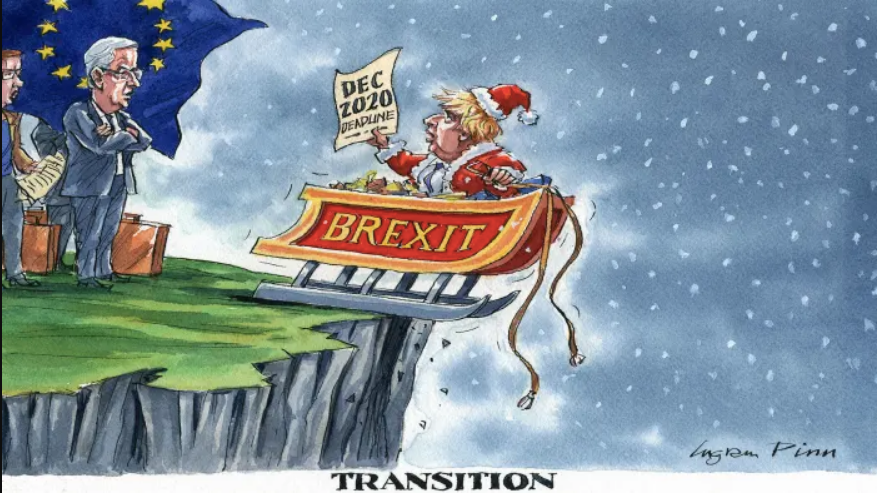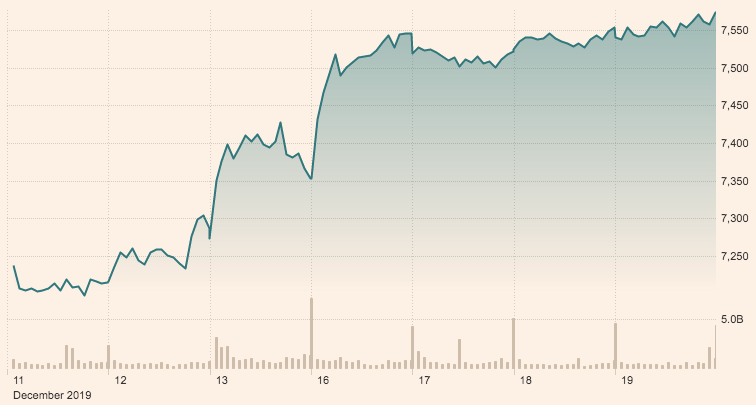- Charlotte Street Partners

- Dec 20, 2019
- 5 min read
20th December 2019
Written by Javier Maquieira, Associate
Edited by Iain Gibson, Associate Partner
Good morning,
"The UK will always be a friend, partner and ally.” Those were the words that Ursula von der Leyen, the new president of the European Commission, used to congratulate Boris Johnson for his electoral victory as both the UK and the European Union brace themselves for post-Brexit trade talks. With Britain’s exit from the single market closer than ever, what will the trading relationship look like after divorce? For one, Johnson is expected today to include in the UK’s Withdrawal Agreement Bill a clause banning any extension to the Brexit transition period beyond December 2020, which certainly raises the chances of a no-deal crash-out. What’s more, von der Leyen’s ambitious Green Deal proposes a refusal to strike any new trade agreement with countries that don’t comply with the Paris Accord’s requirement to increase the scale of their decarbonisation pledges. This would put pressure not only on the United States if president Donald Trump finally drops out of the agreement late in 2020, but also on big economies like China and India. The extent to which these ambitions could hinder a future UK-EU partnership is yet to be seen. Indeed, a protectionist turn is likely to be most visible in trade under the von der Leyen Commission. The new trade commissioner, Ireland’s Phil Hogan, is set to continue developing tougher sanction powers and tightening investment screening mechanisms to block foreign takeovers of European companies. Now, it could be that the economic impact of Brexit on some EU member states makes the deal easier for Johnson’s government, as many sectors lobby the bloc institutions to maintain access to the British market. However, there’s also the possibility that the prime minister decides to capitulate as the deadline approaches, prompting the UK to keep aligning with EU rules while a more detailed long-term partnership is agreed. We’ve learnt it the hard way: Brexit was never an event; it’s a process. And it’s one that will extend well beyond trade negotiations between Brussels and London.
News
Demonstrations have continued in India as tens of thousands take the streets to protest against a controversial citizenship law deemed discriminatory against Muslims. In response to the clashes, the government ordered mobile internet to be shut down in certain areas of the capital Delhi, where the largest protest took place and about 1,200 people were detained on Thursday.
At least one person has died and five have been wounded in a shooting at the headquarters of Russia’s Federal Security Service in Moscow. The gunman, who opened fire with an automatic weapon hours after president Vladimir Putin had held his annual press conference, was killed by an armed officer, while further details of the incident remain unclear.
The Republican majority leader in the US Senate, Mitch McConnell, has asked his fellow party members to correct what he called a “toxic” impeachment of president Trump, while the speaker of the House of Representatives, Nancy Pelosi, said she would not send the case to the Senate until she is convinced of a fair trial. McConnell also accused the Democrat-run Congress of "partisan rage” at Trump.
Business and economy
The Bank of England has decided to keep interest rates on hold at 0.75% as the UK economy is projected to pick up from its current weakness. However, the Bank has announced it would keep track of reactions among businesses and households to Brexit and global growth, with the possibility to cut the cost of borrowing if uncertainty and failure to recover persist. The construction sector has received its lowest score in six-and-a-half years, with the car-making industry suffering one of the biggest declines. The head of the Financial Conduct Authority (FCA), Andrew Bailey, has been selected as the new governor of the Bank of England. A former deputy governor at the Bank, Bailey has long been seen as a highly qualified candidate to take over from Mark Carney, despite some scandals affecting the reputation of the FCA as an effective regulator. (£) The World Bank has highlighted a record surge in borrowing across emerging markets and developing economies to $55tn (£42tn) last year. Although much of the growth in debt levels was led by China, most of the countries covered by the financial institution’s analysis were also affected, marking the largest, fastest and most broad-based increase in almost five decades. The surge is backed by growing dependency on borrowing by both private and public sector organisations.
Columns of note
In The Guardian, Gaby Hinsliff praises Lady Hale, the UK’s first female law lord, as she retires from decades of solid achievement, transforming family life for women and children in particular. Driven by the motto “women are equal to everything”, Lady Hale was one of the masterminds behind the Children Act in the 1980s and a champion of no-fault divorce, as well as the widening of the definition of domestic violence. Hinsliff concludes from Lady Hale’s example that more is needed to boost female confidence, starting with teachers looking twice at those who don’t brim with it early in their careers. Gillian Tett writes in the Financial Times about the shift among investors involved in environmental, social and governance (ESG) issues, who have started to campaign for reform of Big Tech companies like Facebook, Twitter, and Alphabet. Although tech companies had been deemed more ESG compliant than other industries, ESG activist investors are now concerned about the attitude of Silicon Valley businesses towards data privacy and their supply chains, for example. Tett expects this shift to accelerate in the new year despite mixed success. (£)

Markets
What happened yesterday?
London stocks closed in the green on Thursday following the Bank of England’s decision to keep interest rates on hold. The FTSE 100 ended the day up 0.44% at 7,573.82, while sterling was weaker both against the dollar by 0.34% at $1.3034 and versus the euro by 0.44% at €1.1716. There was a lack of corporate news as the pre-Christmas calm began to set in. Royal Bank of Scotland Group (-0.52%) finished lower as chief executive Alison Rose makes changes to its investment banking arm. On the upside, house-builder company Crest Nicholson (+1.05%) ended higher following the appointment of Tom Nicholson as chief operating officer with effect from 1 January.
What's happening today?
Finals Benchmark Hlds Jersey Electricity
AGMs European Metals Holdings Focusrite Riverfort
UK Economic Announcements
(00:01) GFK Consumer Confidence (09:30) BBA Mortgage Lending Figures (09:30) Public Sector Net Borrowing(09:30) Current Account (09:30) Gross Domestic Product
Int. Economic Announcements
(07:00) GFK Consumer Confidence (GER) (09:00) Current Account (EU) (13:30) Gross Domestic Product (US) (13:30) Personal Income (US) (13:30) Personal Spending (US) (13:30) Personal Consumption Expenditures (US) (15:00) U. of Michigan Confidence (US)

Did you know?
The origin of the phrase “in a nutshell” can be traced to Pliny the Elder, whose Natural History mentions a complete manuscript of Homer’s Iliad that was so small it could fit inside the shell of a nut.
Parliamentary highlights
TODAY House of Commons No business scheduled. House of Lords No business scheduled. Scottish Parliament No business scheduled.

Comments